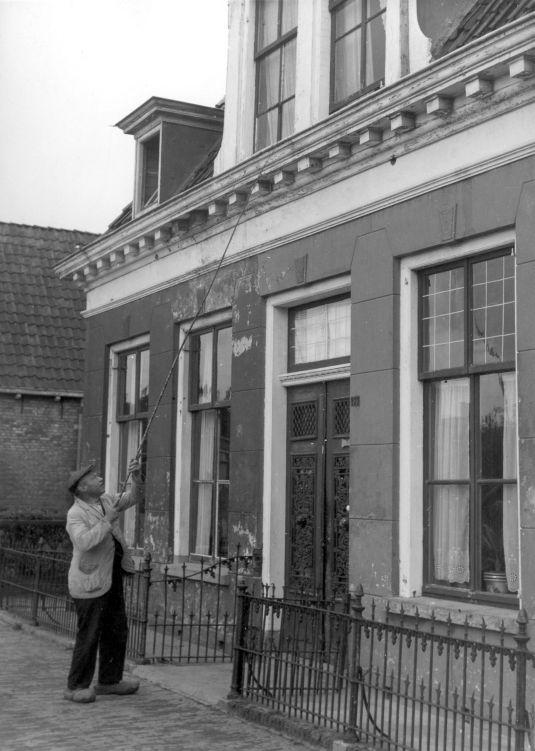|
Knocker-up
A knocker-up or knocker-upper was a member of a profession (''One of the curious ways of earning a livelihood in the manufacturing towns'') in the Netherlands, Britain, Ireland, and some other countries that started during, and lasted well into, the Industrial Revolution, when alarm clocks were neither cheap nor reliable. A knocker-up's job was to rouse sleeping people so they could get to work on time. By the 1940s and 1950s, this profession had died out, although it still continued in some pockets of industrial England until the early 1970s. The knocker-up used a baton or short, heavy stick to knock on the clients' doors or a long and light stick, (''The knocker-up man and his long pole...'') often made of bamboo, to reach windows on higher floors. One famous photograph shot in 1931 by John Topham shows a knocker-up in East London using a pea-shooter. In return for the task, the knocker-up would be paid a few pence a week. Some knocker-ups would not leave a client's window ... [...More Info...] [...Related Items...] OR: [Wikipedia] [Google] [Baidu] |
Alarm Clock
An alarm clock (or sometimes just an alarm) is a clock that is designed to alert an individual or group of individuals at a specified time. The primary function of these clocks is to awaken people from their night's sleep or short naps; they are sometimes used for other reminders as well. Most use sound; some use light or vibration. Some have sensors to identify when a person is in a light stage of sleep, in order to avoid waking someone who is deeply asleep, which causes tiredness, even if the person has had adequate sleep. To turn off the sound or light, a button or handle on the clock is pressed; most clocks automatically turn off the alarm if left unattended long enough. A classic analog alarm clock has an extra hand or inset dial that is used to specify the time at which the alarm will ring. Alarm clocks are also used in mobile phones, watches, and computers. Many alarm clocks have radio receivers that can be set to start playing at specified times, and are known as ''clock ... [...More Info...] [...Related Items...] OR: [Wikipedia] [Google] [Baidu] |
John Topham (photographer)
John Topham (1908–1992) was an English social documentary photographer. He worked steadily from 1927 to 1973, documenting the "ordinary way of life of ordinary people...the little things of life - the way it really was." He is particularly noted for his photographs taken during the World War II era - with some appearing in Life magazine and one currently on display in the Imperial War Museum He amassed 121,228 negatives including 20,000 glass negatives of his earliest work. The TopFoto collection in Edenbridge holds about 122,000 of his pictures, including 20,000 glass negatives.Knocker-up Armed with a Pea Shooter by John Topham (accessed 2012-10-22) Topham worked closely with a |
Great Expectations
''Great Expectations'' is the thirteenth novel by Charles Dickens and his penultimate completed novel. It depicts the education of an orphan nicknamed Pip (Great Expectations), Pip (the book is a ''bildungsroman''; a coming-of-age story). It is Dickens' second novel, after ''David Copperfield'', to be fully narrated in the first person.''Bleak House'' alternates between a third-person narrator and a first-person narrator, Esther Summerson, but the former is predominant. The novel was first published as a serial (literature), serial in Dickens's weekly periodical ''All the Year Round'', from 1 December 1860 to August 1861. In October 1861, Chapman and Hall published the novel in three volumes. The novel is set in Kent and London in the early to mid-19th century and contains some of Dickens's most celebrated scenes, starting in a graveyard, where the young Pip is accosted by the escaped convict Abel Magwitch. ''Great Expectations'' is full of extreme imagery – poverty, prison ... [...More Info...] [...Related Items...] OR: [Wikipedia] [Google] [Baidu] |
Obsolete Occupations
Obsolescence is the state of being which occurs when an object, service, or practice is no longer maintained or required even though it may still be in good working order. It usually happens when something that is more efficient or less risky replaces it. The international standard IEC 62402:2019 Obsolescence Management defines obsolescence as the "transition from available to unavailable from the manufacturer in accordance with the original specification". Obsolete also refers to something that is already disused or discarded, or antiquated. Typically, obsolescence is preceded by a gradual decline in popularity. Consequences Driven by rapid technological changes, new components are developed and launched on the market with increasing speed. The result is a dramatic change in production methods of all components and their market availability. A growing industry sector is facing issues where life cycles of products no longer fit together with life cycles of required components ... [...More Info...] [...Related Items...] OR: [Wikipedia] [Google] [Baidu] |
Mike Canavan
Mike may refer to: Animals * Mike (cat), cat and guardian of the British Museum * Mike the Headless Chicken, chicken that lived for 18 months after his head had been cut off * Mike (chimpanzee), a chimpanzee featured in several books and documentaries Arts * Mike (miniseries), a 2022 Hulu limited series based on the life of American boxer Mike Tyson * Mike (2022 film), a Malayalam film produced by John Abraham * ''Mike'' (album), an album by Mike Mohede * ''Mike'' (1926 film), an American film * MIKE (musician), American rapper, songwriter and record * ''Mike'' (novel), a 1909 novel by P. G. Wodehouse * "Mike" (song), by Elvana Gjata and Ledri Vula featuring John Shahu * Mike (''Twin Peaks''), a character from ''Twin Peaks'' * "Mike", a song by Xiu Xiu from their 2004 album ''Fabulous Muscles'' Businesses * Mike (cellular network), a defunct Canadian cellular network * Mike and Ike, a candies brand Military * MIKE Force, a unit in the Vietnam War * Ivy Mike, the first ... [...More Info...] [...Related Items...] OR: [Wikipedia] [Google] [Baidu] |
Oldham
Oldham is a large town in Greater Manchester, England, amid the Pennines and between the rivers Irk and Medlock, southeast of Rochdale and northeast of Manchester. It is the administrative centre of the Metropolitan Borough of Oldham, which had a population of 237,110 in 2019. Within the boundaries of the historic county of Lancashire, and with little early history to speak of, Oldham rose to prominence in the 19th century as an international centre of textile manufacture. It was a boomtown of the Industrial Revolution, and among the first ever industrialised towns, rapidly becoming "one of the most important centres of cotton and textile industries in England." At its zenith, it was the most productive cotton spinning mill town in the world,. producing more cotton than France and Germany combined. Oldham's textile industry fell into decline in the mid-20th century; the town's last mill closed in 1998. The demise of textile processing in Oldham depressed and heavily ... [...More Info...] [...Related Items...] OR: [Wikipedia] [Google] [Baidu] |
North West Film Archive
The North West Film Archive (NWFA, established 1977) in Manchester, is a moving image collection for the North West of England. The archive cares for 35,000 items ranging in date from the pioneer days of film in the mid-1890s to video productions of the present day. The work of both the professional and the amateur is collected. The NWFA is a part of the Learning and Research Information Services (library) at Manchester Metropolitan University and is located in Archives+ at Manchester Central Library. History The North West Film Archive is Britain's largest public film collection outside London. The archive was set up in 1977 and is the home for moving images made in or about Greater Manchester, Lancashire, Cheshire, Merseyside and Cumbria. The region's position at the forefront of industrialisation is reflected in the archive's collection. The archive works with colleagues in national and regional film archives throughout the country. In 1994 the NWFA became a member of the ... [...More Info...] [...Related Items...] OR: [Wikipedia] [Google] [Baidu] |
Vimeo
Vimeo, Inc. () is an American video hosting, sharing, and services platform provider headquartered in New York City. Vimeo focuses on the delivery of high-definition video across a range of devices. Vimeo's business model is through software as a service (SaaS). They derive revenue by providing subscription plans for businesses and video content producers. Vimeo provides its subscribers with tools for video creation, editing, and broadcasting, enterprise software solutions, as well as the means for video professionals to connect with clients and other professionals. , the site has 260 million users, with around 1.6 million subscribers to its services. The site was initially built by Jake Lodwick and Zach Klein in 2004 as a spin-off of CollegeHumor to share humor videos among colleagues, though put to the side to support the growing popularity of CollegeHumor. IAC acquired CollegeHumor and Vimeo in 2006, and after Google had acquired YouTube for over , IAC directed more effo ... [...More Info...] [...Related Items...] OR: [Wikipedia] [Google] [Baidu] |
Burnley
Burnley () is a town and the administrative centre of the wider Borough of Burnley in Lancashire, England, with a 2001 population of 73,021. It is north of Manchester and east of Preston, at the confluence of the River Calder and River Brun. The town is located near the countryside to the south and east, with the towns of Padiham and Brierfield to the west and north respectively. It has a reputation as a regional centre of excellence for the manufacturing and aerospace industries. The town began to develop in the early medieval period as a number of farming hamlets surrounded by manor houses and royal forests, and has held a market for more than 700 years. During the Industrial Revolution it became one of Lancashire's most prominent mill towns; at its peak, it was one of the world's largest producers of cotton cloth and a major centre of engineering. Burnley has retained a strong manufacturing sector, and has strong economic links with the cities of Manchester an ... [...More Info...] [...Related Items...] OR: [Wikipedia] [Google] [Baidu] |
The Worst Jobs In History
''The Worst Jobs in History'' is a British television series hosted by Tony Robinson on Channel 4. The second series was shown in March 2006 on History Television in Canada, then in April 2006 on Channel 4 in the UK. The first season is also shown with some regularity on History International. Tony Robinson tries his hand at each of the jobs, ultimately nominating which one he thought was the worst in each program. First series This was broadcast in 2004 and concentrated on a different historical period per program: Roman, Anglo-Saxon, Medieval, Tudor, Stuarts, Georgian, and Victorian. Some of the more repulsive or dangerous jobs included fuller, executioner, leech collector, plague burier, rat-catcher, leather tanner, gong farmer, and sin-eater. There was a one-off special called ''The Worst Christmas Jobs in History'' in December 2005. Second series Broadcast first in March 2006 on The History Channel in Canada, then in April 2006 on Channel 4 in the UK. This series conc ... [...More Info...] [...Related Items...] OR: [Wikipedia] [Google] [Baidu] |
Maurice Elvey
Maurice Elvey (11 November 1887 – 28 August 1967) was one of the most prolific film directors in British history. He directed nearly 200 films between 1913 and 1957. During the silent film era he directed as many as twenty films per year. He also produced more than fifty films - his own as well as films directed by others.Rachael Low:''The History of British Film (Volume 3): The History of the British Film 1914 - 1918'' Linked 2015-03-18 Biography Born William Seward Folkard in[...More Info...] [...Related Items...] OR: [Wikipedia] [Google] [Baidu] |




